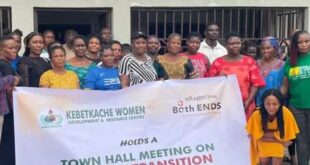By Kelechi Nwaucha
Despite the lack of droughts in the Niger Delta, the world’s second largest wetland, their manifestations in the Northern part of Nigeria are impacting drastically on the women and children in the South of the country.
Publisher of the National Point Newspaper, Chief Constance Meju, on the sidelines of OLEGH Centre for Community Development’s press briefing on the World Environment Day, said the drought-induced migrations of cattle herdsmen have taken a heavy toll on the Niger Delta.
Though rich in crude oil deposits, decades of oil exploration by multinationals have severely degraded the once fertile Niger Delta land, and in the process steadily pushing farmers and fishermen into extinction.
With far less lands and water bodies available for farming and fishing, the situation is made worse by the migration of herdsmen down South and the ensuing farmer/herdsmen conflict that has engulfed the country.
According to a research by two lecturers in the University of Abuja, the farmer-herdsmen conflict in the Nort-Central zone of the country had led to the death of over 60,000 Nigerians since 2001.
In a report published in Punch, one of the lecturers, Dr. Olowu Olagunju, said “The farmer-herder crisis has been reported in 22 out of the 36 states in Nigeria with the North-Central zone having the highest incidences in the country. The crisis has resulted in lethal violence which accounted for over 60,000 deaths since 2001, a death toll that was higher than that of the Boko-Haram insurgency.”
Fielding questions from newsmen at the OLEGH press briefing on the World Environment Day, Meju said the worst hit in the migratory activities of herdsmen down south are women and children in the Niger Delta.
“When we talk about droughts, we don’t have droughts here (in Niger Delta), but we are suffering the effects of droughts.
“When the droughts hit up north, they move their cattle to greener pastures. And when they come to greener pastures, they come to the farms of the southerners.
“The presence of the headsmen, the damage that they do to our farms, and the farms that they damage are the farms of the women, because women are the major farmers here in the Niger Delta.
“Also, the dangers that it poses. Last month a woman was raped in one of the communities in Eleme, in her farmland. And you know, Eleme women have been complaining seriously about headsmen.
“Secondly, the question of land degradation has caused so much problems in the Niger Delta. You find that women are affected. Last year in Okuzi, while the government was trying to fight people who were doing illegal refining, a woman working on her farm received fire burns from the sprays that the Air Force released, so she had to be hospitalized for some time.
“These are the ways that it affects women. And also, it impoverishes them seriously. That’s why OLEGH is very concerned about the welfare of women in relation to the environment,” Chief Meju.
In Ughelli North and neighbouring LGAs in Delta, farmer-herdsmen crisis has become an enduring cycle, repeating itself every farming season and severely impacting on food production in the area.
 PH Mundial – Port Harcourt Online Newspaper News Across The Region
PH Mundial – Port Harcourt Online Newspaper News Across The Region





